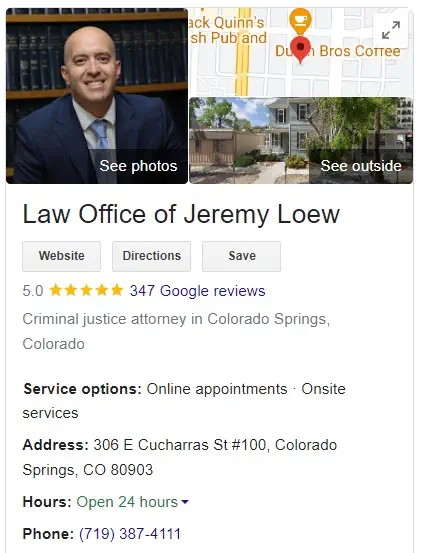How Can I Help My Case?
What Can I Do To Help My Case?
Please give me a call – there’s a good chance I can help you if you’re charged with a crime.
Can I Really Help My Case?
If a person is accused of a crime in Colorado, there are several steps they can take to help their case and protect their rights.
It’s crucial to approach the situation carefully and thoughtfully, as actions taken after an accusation can significantly impact the outcome of the case.
Here are some key strategies:
- Exercise the Right to Remain Silent: Under the Miranda rights, anyone accused of a crime has the right to remain silent to avoid self-incrimination. It’s important to exercise this right until legal representation is present. Anything said can be used against the individual in court.
- Seek Legal Representation: One of the most important steps is to obtain experienced legal counsel. A criminal defense attorney will provide guidance, represent the accused’s interests, and help navigate the complexities of the legal system. Ideally, this should be someone experienced in Colorado’s criminal law.
- Comply with Legal Procedures: While maintaining innocence or disputing the charges, it’s crucial to comply with all legal procedures and court orders. This includes appearing at all scheduled court dates and adhering to any bail conditions.
- Gather Evidence and Witnesses: If there are any witnesses who can corroborate the accused’s version of events or provide an alibi, it’s important to let the attorney know. Similarly, any evidence that could help in proving innocence or raising reasonable doubt should be collected and presented to the defense attorney.
- Document Everything: Keeping a detailed record of all events and interactions related to the case can be helpful. This includes dates, times, places, and the names of people involved.
- Avoid Discussing the Case: It’s advisable to avoid discussing the case with anyone other than the attorney. This includes conversations with friends, family, and especially on social media platforms. Anything said can be misconstrued and potentially used against the accused.
- Understand the Charges: Fully understanding the charges and their implications is crucial. The defense attorney can explain the nature of the charges, the possible penalties, and the legal processes involved.
- Consider a Plea Deal Carefully: If the prosecutor offers a plea deal, it should be considered carefully and discussed thoroughly with the attorney. Plea deals can sometimes offer a more favorable outcome, but they also involve admitting to certain charges.
- Prepare for Court Appearances: If the case goes to trial, it’s important to be well-prepared. This includes dressing appropriately for court, understanding court etiquette, and being ready to testify if advised by the attorney.
- Stay Out of Further Trouble: Avoid any activity that could lead to additional charges or negatively impact the current case. Staying out of trouble is crucial during the pending case.
- Follow Attorney’s Advice: The defense attorney will provide specific advice based on the nuances of the case. It’s crucial to follow this advice and communicate openly with the attorney.
- Consider Psychological Support: Facing criminal charges can be extremely stressful. Seeking psychological support or counseling can help in dealing with the emotional and mental strain of the process.
It’s important to remember that every criminal case is unique, and the best course of action will depend on the specific circumstances of the case.
An experienced criminal defense attorney can provide tailored advice and representation to navigate the legal challenges and work towards the best possible outcome.
NEED LEGAL HELP?
Contact Us for a Free Consultation!


